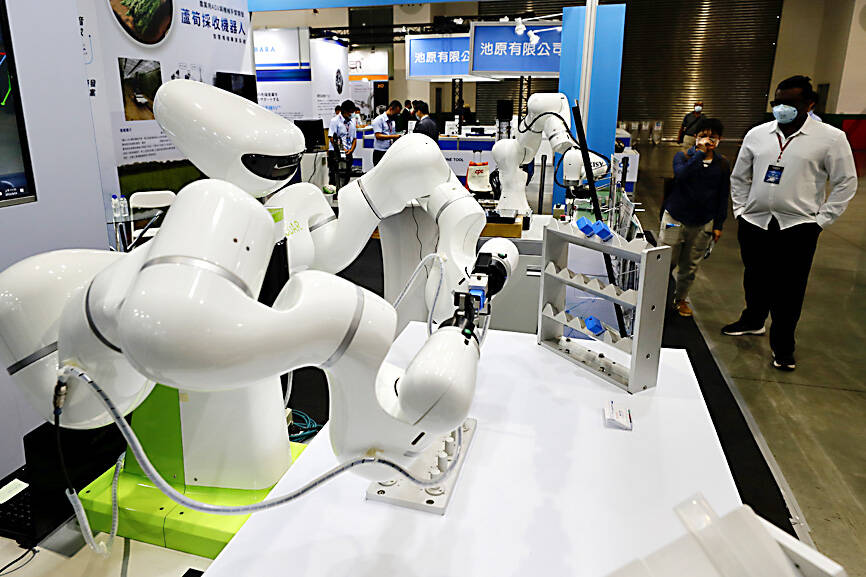Taiwan’s machinery exports last month fell 21.7 percent year-on-year, dropping for a 12th straight month, the Taiwan Association of Machinery Industry said in a report yesterday.
The decline was in line with the extended contraction in the nation’s overall outbound shipments, which fell 10.4 percent annually during the same period.
Machinery exports totaled US$2.65 billion last month, down from US$3.38 billion a year earlier, data compiled by the association showed.

Photo: Ritchie B. Tongo, EPA-EFE
However, on a monthly basis, machinery exports increased 11.04 percent from US$2.38 billion, the data showed.
The association attributed the annual contraction last month to manufacturers remaining conservative about investment amid a global economic slowdown.
China’s weaker-than-expected economic recovery and US interest rate hikes also weighed on Taiwanese exports, as the two countries are Taiwan’s largest export markets, it said.
Orders received by local machinery makers started to shrink in August last year when global demand slowed, but last month’s annual decline in exports was smaller than June’s 22.5 percent contraction, the association said.
Furthermore, overseas shipments of inspection and testing equipment, electronic equipment and machine tools were higher than the previous month, indicating that demand for such products remains rigid and the impact of inventory destocking is decreasing, it added.
In the first seven months of the year, machinery exports slid 19.4 percent year-on-year to US$17.01 billion, the association’s data showed.
The US was the largest buyer of Taiwanese machinery products in the first seven months, with purchases totaling US$4.09 billion, accounting for 24 percent of Taiwanese exports.
China ranked second, with purchases totaling US$3.94 billion for a 23.1 percent share of Taiwanese exports.
In third place was Japan, with purchases totaling US$1.38 billion and accounting for 8.1 percent of the total, the data showed.
The association said that it is cautiously optimistic about the industry’s near-term outlook, as manufacturing investment enters its peak season and inventory adjustment gradually comes to an end.
Replacement demand on the back of the global energy-saving and carbon-reduction trends should also drive the industry, it said.
The government’s policy to stimulate domestic demand should further boost order momentum for local machinery makers, the association said.

SEASONAL WEAKNESS: The combined revenue of the top 10 foundries fell 5.4%, but rush orders and China’s subsidies partially offset slowing demand Taiwan Semiconductor Manufacturing Co (TSMC, 台積電) further solidified its dominance in the global wafer foundry business in the first quarter of this year, remaining far ahead of its closest rival, Samsung Electronics Co, TrendForce Corp (集邦科技) said yesterday. TSMC posted US$25.52 billion in sales in the January-to-March period, down 5 percent from the previous quarter, but its market share rose from 67.1 percent the previous quarter to 67.6 percent, TrendForce said in a report. While smartphone-related wafer shipments declined in the first quarter due to seasonal factors, solid demand for artificial intelligence (AI) and high-performance computing (HPC) devices and urgent TV-related orders

Taiwan Semiconductor Manufacturing Co (TSMC, 台積電) and the University of Tokyo (UTokyo) yesterday announced the launch of the TSMC-UTokyo Lab to promote advanced semiconductor research, education and talent development. The lab is TSMC’s first laboratory collaboration with a university outside Taiwan, the company said in a statement. The lab would leverage “the extensive knowledge, experience, and creativity” of both institutions, the company said. It is located in the Asano Section of UTokyo’s Hongo, Tokyo, campus and would be managed by UTokyo faculty, guided by directors from UTokyo and TSMC, the company said. TSMC began working with UTokyo in 2019, resulting in 21 research projects,

Quanta Computer Inc (廣達) chairman Barry Lam (林百里) yesterday expressed a downbeat view about the prospects of humanoid robots, given high manufacturing costs and a lack of target customers. Despite rising demand and high expectations for humanoid robots, high research-and-development costs and uncertain profitability remain major concerns, Lam told reporters following the company’s annual shareholders’ meeting in Taoyuan. “Since it seems a bit unworthy to use such high-cost robots to do household chores, I believe robots designed for specific purposes would be more valuable and present a better business opportunity,” Lam said Instead of investing in humanoid robots, Quanta has opted to invest

EXPANSION: While Gigabyte Technology is optimistic about market demand this year, uncertainty remains due to the impact of potential US tariffs and currency fluctuations Motherboard and graphics card maker Gigabyte Technology Co (技嘉) yesterday said that it plans to launch an artificial intelligence (AI) server assembly line in the US in the second half of this year. The company’s core motherboard and graphics card businesses in the US remain stable, but sales of its higher-priced AI servers still hinge on the development of tariff policies, Gigabyte chairman Dandy Yeh (葉培城) told reporters following the company’s annual shareholders’ meeting in Taipei. Yeh was referring to the “reciprocal” tariffs announced by US President Donald Trump on April 2, which were later postponed for 90 days. While Gigabyte